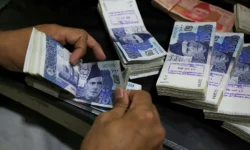Pakistan registers 2.4 percent growth during fiscal year, economic survey shows

11 June 2024
Published in: Arab News
Pakistan’s gross domestic product (GDP) recorded a growth of 2.38 percent during the outgoing fiscal year 2023-24, the government’s annual economic survey released on Tuesday showed.
Finance Minister Muhammad Aurangzeb revealed these statistics as he presented the Pakistan Economic Survey for FY2024, a day before Prime Minister Shehbaz Sharif’s government is scheduled to release the federal budget for FY2024-25 in parliament.
The survey provides details about the major socioeconomic developments, performances and trends in various sectors of Pakistan’s economy during the outgoing fiscal year. These include agriculture, manufacturing, industry, services, energy, information technology and telecom.
Speaking at the event, Aurangzeb credited PM Sharif’s “courageous step” in overseeing a nine-month loan agreement with the International Monetary Fund (IMF), saying it helped achieve the country’s economic targets.
“Without it, God forbid, we wouldn’t be here discussing targets,” the minister said. “We would have been in a different situation and we would have had the same discussion in a very different context.”
According to the survey, Pakistan’s GDP has increased to $375 billion in value with a 26.4 percent increase from the previous year’s $338 billion while the per capita income has increased to $1,680 from $1,551 compared to the previous year.
The investment-to-GDP ratio has recorded a decrease of 13.14 percent from 14.13 percent last fiscal year. However, the survey showed that the agriculture sector demonstrated a growth of 6.25 percent while the industrial and services sectors both posted a growth of 1.21 percent.
The minister said the agriculture sector, backed by bumper sales of crops during the fiscal year, had proven to be a “savior” of the economy.
“Agriculture is going to remain a huge lever of growth as we go forward,” Aurangzeb noted, adding that an “unprecedented” 30 percent growth was recorded in Pakistan’s revenue collection.
The survey document shows Pakistan’s exports increased by 9.3 percent from July 2023 to March 2024, surging to $23 billion compared to the $21.1 billion figure from the same period last year.
Meanwhile, imports from July 2023 to March 2024 amounted to $38.8 billion compared to $42.1 billion in the same period last year, reflecting a decline of 8 percent. This caused the country’s trade deficit to shrink to 4.2 percent of its GDP compared to 7.3 percent from last year.
’CONSTRUCTIVE’ IMF TALKS
The finance minister also spoke about the government’s recent negotiations with the IMF for a fresh loan agreement, saying they had been “positive and constructive.”
An IMF team, led by mission chief Nathan Porter, arrived in Pakistan on May 13 and held discussions on the new bailout for more than week before leaving without signing a staff agreement.
“I have said this many times, I see this as a Pakistan program which is being aided, supported, and funded by the IMF,” the minister explained.
Sharif has publicly expressed his commitment to tough reforms demanded by the IMF. However, high prices, unemployment and a lack of new job opportunities have piled political pressure on his coalition government.
The finance minister stressed the need to enhance Pakistan’s tax-to-GDP ratio and introduce reforms in the power sector to meet the global lender’s demands for the next loan program.
In response to a question, Aurangzeb said the South Asian country would run on taxes collected from the people and businesses, not on charity.
“There are no sacred cows, everyone will have to contribute to the economy,” he said. “Because schools, hospitals, and universities can run through philanthropy, but not countries. They run on taxes.”





